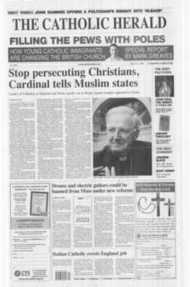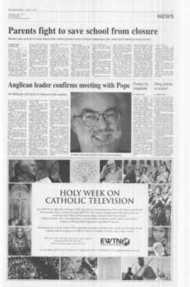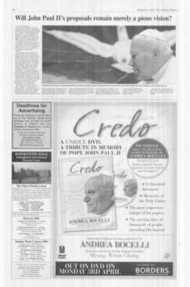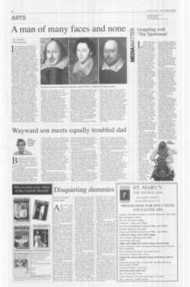Page 11, 31st March 2006
Page 11

Report an error
Noticed an error on this page?If you've noticed an error in this article please click here to report it.
Tags
Share
Related articles
Education
Faith On The Fault Line
Girls Bring A 'second Spring' To Downside
North's Quieter Approach To The Faith
Searching For The Truth About A Monstrous Crime
Keeping the faith and fixing the drains
The buildings of Rugby School sprawl -across the centre of town. This 400-year-old institution the setting for Torn Brown's Schooldays could not be more British; yet the sense of glorious traditioti that it brings to this corner of Warwickshire is being quietly undermined.
In a country church nestled just beyond Rugby's borders, Mass is being celebrated. If anyone were to lurk outside the door of St Marie's at midday on a Sunday, it would not be English prayers that whispered through, but Polish.
Indeed, the foreign Language would not be the only surprise. The strumming of guitars and the sound of folk music would also filter through, and the curious might start to wonder whether this obviously Catholic church had been infiltrated by members of the Pentecostal movement.
1 loiter outside, waiting to speak to Fr Richard Zalewski, and watch as a crowd of more than 100 people gather in the yard. I've been told that the Polish are more respectful towards their priest, and so I am expecting a grave . marl, offended by the intrusions of a pesky English journalist. But, when I tell him that I have come all the way from London to see him, Fr Zalewski responds by laughing with his entire body. (During our conversation, I laugh along with him, sometimes without really knowing why.)
Two years ago, he explains, only 30 Poles attended his weekly Mass; now, the church is packed with around 150 Polish parishioners, most of them young. He travels from his parish in Coventry every Sunday and is part of a new breed of itinerant Polish priest struggling to celebrate Mass in small towns across Britain.
"When I came to England 18 years ago, life was easy," he says. "I only ever did funerals.
"These days I am busy with baptisms, First Communions, marriages. I have been asked to do 15 baptisms, and 20 couples have come to me for the sacrament of marriage."
Poles are the fastest growing minority in Britain; according to some estimates, their number has now reached 750,000. The expanding congregation in Rugby, although still quite small, is one example of what is the biggest demographic shift in the Catholic population of Britain since Irish immigration in the 19th century. In Scotland, for instance, the flock of Bishop Peter Moran of Aberdeen has swelled at such a rate that he made the trip to Poland to lure back priests who could serve in his diocese. He claims that, in the last two years, the Catholic population in Inverness has actually tripled as a result of the Polish influx.
The migration began in May 2004, when Britain, along with Ireland and Sweden, opened up its borders to the new member states of the European Union. The recently arrived immigrants are young 82 per cent are aged between 18 and 34 and educated. For the British middle classes, they represent an emergency taskforce of plumbers and cleaners, come to save our drains and apply French polish to our coffee tables.
The migration has had a dramatic effect too on the existing Polish community, says Fr Zalewski, and has revived its Catholic traditions. The solemn harmonies of the Polish Rugby choir now alternate with folk songs provided by a troupe of young women with guitars.
The Catholic faith is deeply entrenched in
Polish culture, and it was the Church and John Paul II in particular that inspired its people to challenge the Communist government in the early 1980s. The demonstrations of the opposition movement were not violent; instead, the protestors faced down water cannons and tanks armed only with rosaries and portraits of the Pope.
So it would be no exaggeration to suggest that such a large influx of devout Polish immigrants could shape the future of Catholic life in Britain.
Fr Joe Mullen of Hilton, the chaplain of Rugby's
Catholic state school, is surprised by the religious vitality of young people from Eastern Europe. He talks of three Slovakians who stayed in his parish over the summer. "We put on talks about various aspects of the faith and they encouraged younger members of the parish to come," he says. They made our young people, perhaps
for the first time, proud to he Catholic."
Fr Zalewski shows enormous enthusiasm for Britain's Catholic schools Bishop Wulstan Enterprise and Business College, the town's only Catholic school, was saved from closure in the summer after parents from the Polish community wrote letters to councillors and school governors offering their support.
One member of the congregation, Joanna Kunda, who arrived in England in May last year, has become one of the school's music teachers. She says that the Polish are keen to have their children educated in the Catholic tradition.
Joanna, having worked in a Catholic school since September, is more familiar with England's own particular brand of faith than the other Poles I meet. It seems that, from her perspective, English Catholics have a strangely negligent attitude to the state Of their souls. Joanna talks of her surprise when she saw the vast majority of the congregation receive Holy Communion.
"In Poland it's not like that. Every single thing we do wrong is a sin, which we have to confess before we can go to Communion."
She explains that at the beginning of each month, after Confession, Communion is received by everyone; but, as the month progresses, fewer people go, until the cycle is repeated again. "The English do not seem so aware of everything that is sinful," she says. Confession plays an important role in Polish life, and their communities revolve closely around the parish priest.
But while the congregations at Polish Mass may he doubling and trebling around the country (and. in
London, spilling into the aisles and even, in some cases, on to the streets), English-language Masses have not seen a comparable rise in attendance. Joanna tells me that only occasionally, for days of special importance, do the Poles attend English Mass. She argues that many of the most recent immigrants do not have a sufficient grasp of English, and since Mass is available in their own language anyway, they see little need to struggle with a ceremony conducted in an alien tongue.
"It is easier to pray in your own language," says Mgr Tadeusz Kukla, vicardelegate for Poles in Great Britain. "It is the language of your prayer, your heart; we may understand English prayer, but we do not feel it."
Fr Zalewski insists that Polish Masses in this country are not just a passing phase. He explains that many parishes established in Britain after the Second World War are still around now, and he predicts that the network of parishes and commuting Polish priests will only become more farreaching.
This might not be such good news for the Church. If the religious fervour of the Poles is confined to these enclaves, it may have little effect on the rest of the country's parishes.
But what happens when there is no alternative to English-language Mass? This is the case in Andover, Hampshire, where the parish priest is Fr Des Connolly (a wiry, energetic man, with a seraphic singing voice). Fr Connolly is uniquely aware of the new Polish immigrants, since those bereft of a home have often ended up living in his house. He
maintains that the number of Poles arriving in Andover is far greater than the number that join his congregation. Swathes of the immigrant population, he thinks, will begin to lapse once they are in England.
"Even those who stay in the priest's house do not necessarily go to Mass," he says ruefully.
The Polish have come to Britain for economic rather than spiritual enrichment. Their priority is work, says Fr Connolly, and their faith may be neglected once they find themselves cut off from a support network of young Catholics. There is the enervating effect of adjusting to such a pagan country as England, where young people are forced to confront widespread disregard, even hostility, towards their religion.
For some Catholics from Eastern Europe, it seems that living in such a country both secular and, for
them, confusingly multicultural only makes them want to go home. Fr Connolly tells me he asked a group of Slovakians if they were keen to stay here permanently. and they said "no". As he explains: "They feel it is a place largely without faith, without God."
blog comments powered by Disqus



















